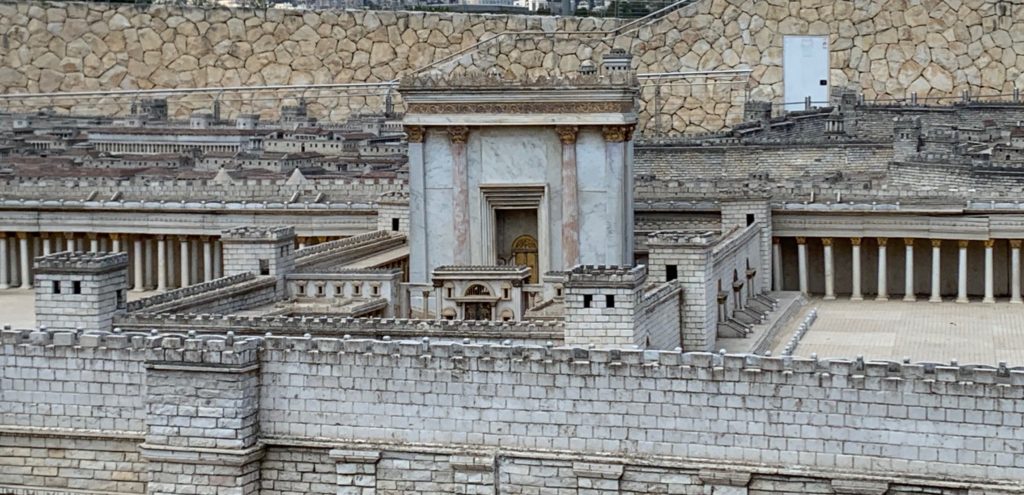“Devote your heart and soul to seeking the Lord your God.”
(1 Chronicles 22:19a NIV)
These are David’s instructions to his son, Solomon and we don’t have to be terribly familiar with the details of David’s story to read between the lines and catch full meaning. The fatherly advice follows the Shema but it also reminds us of David’s own wanderings. David let his lust grow larger than his love for God. His fatal attraction to another man’s wife, Bathsheba, eclipsed his loyalty to the One True God. He temporarily lost focus and compromise stepped in real quick: adultery, deception, pre-meditated murder took place in a matter of days. God didn’t even decide upon David’s penance for the Uriah mess; King David decreed it against himself.
“He must pay for the lamb four times over because he did such a thing
and had no pity!” (2 Samuel 12:6 NIV)
David did pay. He lost four sons, four lambs. First, the unnamed illegitimate baby conceived with Bathsheba. Then, Amnon, the son destroyed with lust for his sister. Absolom follows, only after attempting to overthrow his father’s throne. And lastly, Adonijah, a second son involved a second coup.
I believe that David was deeply marked by all these losses. The text reads as though he was changed beyond his post-Bathsheba encounter with the prophet Nathan. He seemed more like a declawed house-cat than the fierce king he began his reign as. Compiled loss conceived in sin can humble a person fast. David’s deep knowledge of his personal contribution to his family’s calamities had to be staggering; crippling as king and patriarch alike. Consider all that for a moment and then turn your attention back to today’s scripture: David’s instructions to his son, Solomon, as he hands off the throne.
“Devote your heart and soul to seeking the Lord your God.”
(1 Chronicles 22:19a NIV)
I don’t see this as some tidy little instructions for kingdom tending. This isn’t a bright yellow post-it note for the palace bathroom mirror. No, I see it as the impassioned plea passed down from a generation gouged with regret. David, the man once described as being “after God’s own heart” was doing a final tally on his days and coming up short. He realized that he had started strong but somehow allowed himself to be distracted along the way and wound up missing what was most important. His heart was shattered over the outcomes of his sin and because of the shattering, he implored his surviving son, Solomon, not to make the same mistake. Even his next instructions framed out this father’s singular desire for his son’s coming reign:
“Begin to build the sanctuary of the Lord God, so that you may bring the ark of the covenant and the sacred articles belonging into the Temple that will be built for the name of the Lord.” (1 Chronicles 22:19b NIV)

“Build the sanctuary!” David declares. Let that be your life’s work. We must remember that the Temple was the physical epsression of God’s presence with His people and therefor crucial to the successful establishment of Israel as a theocratic monarchy. The king building the Temple would be a sign of his loyalty and leadership toward the One True God; it was necessary and needed. Kings can’t lead people where they aren’t going themselves. Israel needed a godly king and the Israelites required a place to observe their God-Instructions. They had to have a brick and mortar memorial to tug their eyes upward. David was essentially pleading with his son; “Don’t bother building your kingdom. Spend yourself building God’s Kingdom. Put your whole heart and soul into it. Never take your foot off the gas of God-worship.”
So what does this mean to us today? Like David, we are easily distracted. Temptation sneaks in, ever-ready to disrupt us, to tear us off our God-designed course. We can’t afford to forget that there is a very real enemy seeking to devour. King David’s instructions still apply: Love God with heart and soul and build His Kingdom not our own. Some of us need to heart that again today. Realistically, we probably all could benefit from daily reminding.
David didn’t finish well. Neither did his fully-warned son, Solomon. In fact, out of a whole string of kings, very few of them “did right in the eyes of the Lord.” We flip through Kings and Chronicles and note that a life of faithfulness will require daily dedication, not just occasional cooperation.
Lord, may we heed David’s words in our own story. Let us spend ourselves on You: heart, mind and soul. We re-dedicate our lives to building Your Kingdom, not our own. Remind us often of this covenant commitment. We want to honor You in all our days. Amen.